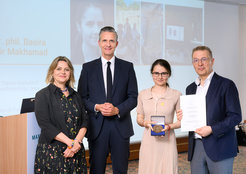Dr. Basira Mir Makhamad Wins 2024 Otto Hahn Medal
The Otto Hahn Medal is awarded in recognition of outstanding achievements from the initial
creative period of young scientists
In a ceremony this week in Magdeburg, Germany, Dr. Basira Mir Makhamad of the Domestication and Anthropogenic Evolution research group at the Max Planck Institute of Geoanthropology received the prestigious 2024 Otto Hahn Medal. She joins 9 other young researchers from the Human Sciences Section at Max Planck Society as the latest recipients.

In Jena, Mir Makhamad’s research focuses on tracing the origins of woody perennial fruit crops in Central Asia and studying the agricultural diversity in ancient southern Central Asia. Using a combination of archaeobotanical, historical, and linguistic data, she explores agricultural diversification and the driving forces behind it from the first to twelfth centuries CE. Her further plans are to shed light on the diet in Central Asia during and after the Mongol Conquest, which has never before been a subject of research. To that end, she recently contributed to a special issue of Philosophical Transactions of the Royal Society B, in which researchers call for a rethink of the concept of domestication.
“The award is given for the first ever systematic archaeobotanical research at the heart of the ancient trans-Eurasian exchange routes that have colloquially come to be known as the Silk Road,” Max Planck President Patrick Cramer said in a letter.
“I would like to thank the Max Planck Society and Max Planck Institute of Geoanthropology for a great experience and the chance to meet many young scholars conducting diverse research across the Max Planck Institutes. The opportunity to present my work was especially meaningful at a time when archaeobotany is increasingly overshadowed by genetics and other molecular methods in many of the leading institutes and universities across Europe, despite its ability to provide solid and cost-effective evidence,” says Mir Makhamad.
“The Domestication and Anthropogenic Evolution research group at the Max Planck Institute of Geoanthropology continues to produce an impressive amount of raw data each year and actively contributes to broader academic discussions. I hope that archaeobotany not only persists, but continues to grow and is recognized as a valuable complementary approach within multidisciplinary research. In my view, truly objective insights emerge when both morphological (macroscopic) and molecular methods are applied together, helping to minimize potential biases and limitations,” she concludes.












